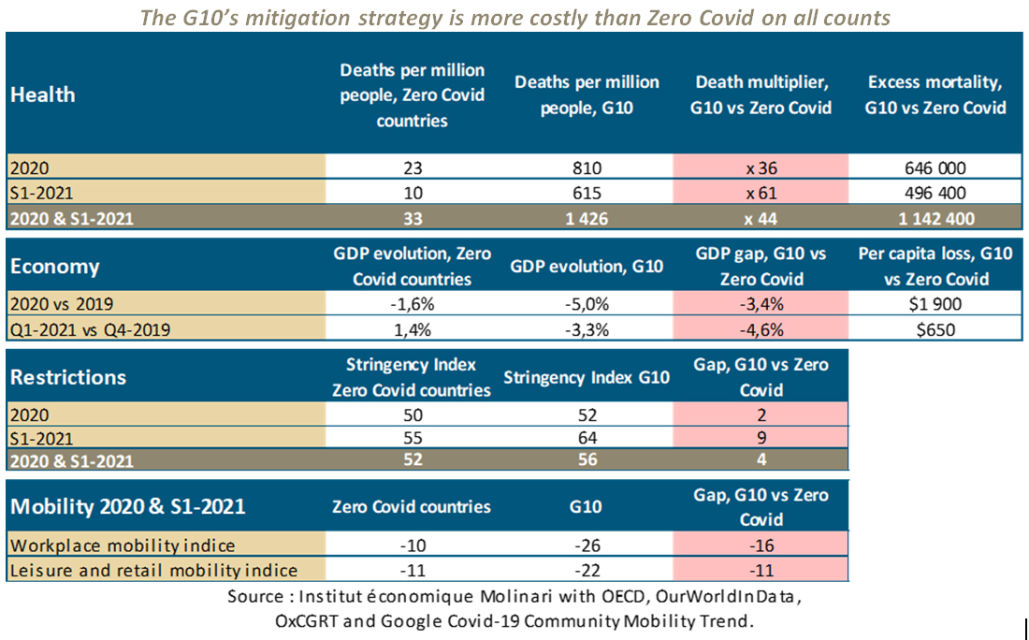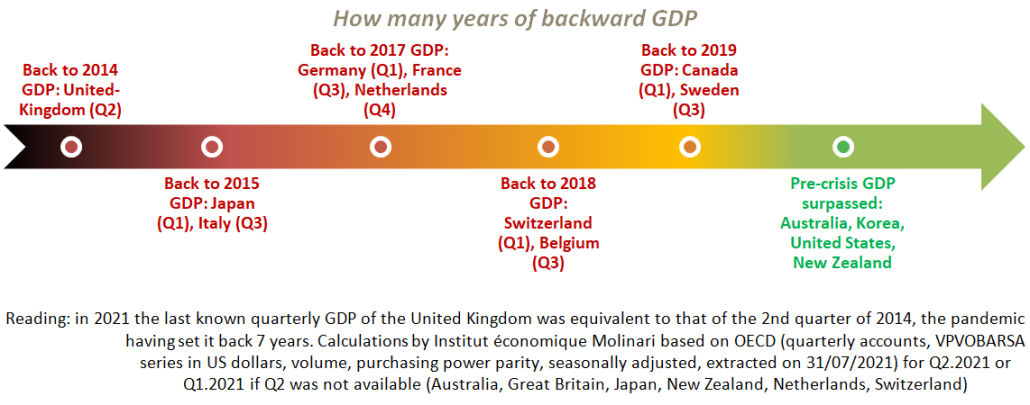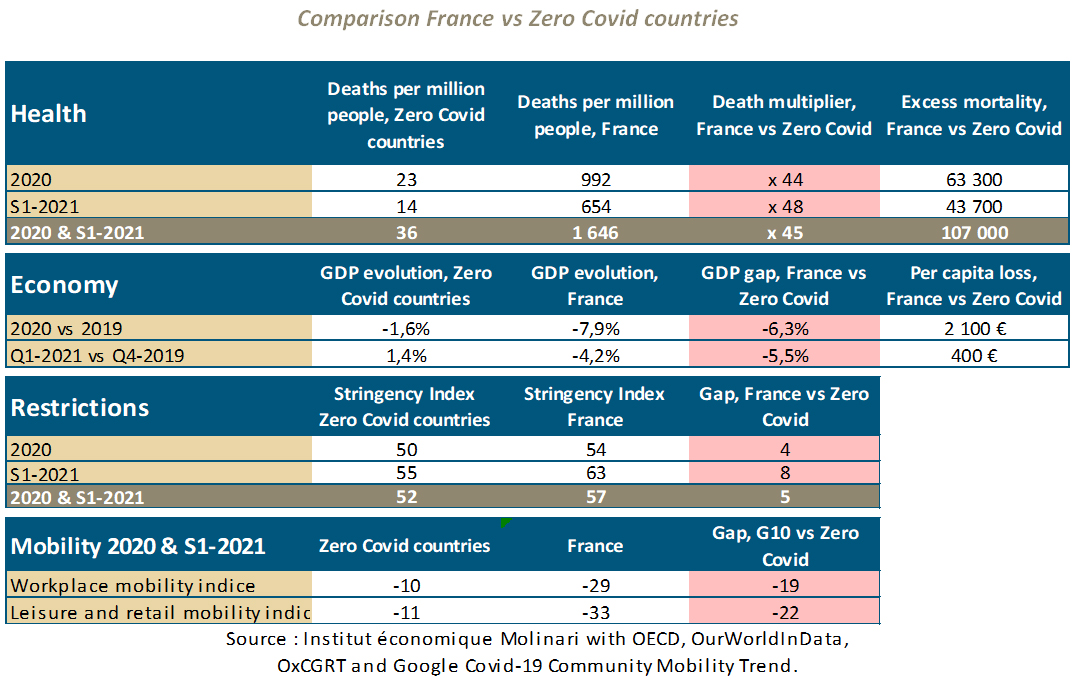The Zero Covid strategy protects people, economies and freedoms more effectively
Read the study (PDF Format)
Read the Press release
Read the study in French (PDF Format)
Read the French Press release
—————
Zero Covid strategy better protects health, but not only
The G10 countries are far more affected by the pandemic in all aspects than the OECD countries that have opted for the Zero Covid strategy or similar, a representative benchmark of 82 million inhabitants of economically advanced democracies.
The number of deaths per million inhabitants was 44 times higher in the G10 countries, which means 1.1 million too many deaths by June 30, 2021. Economic performance, civil liberties and mobility were also worse.

The zero covid strategy benefits the economy
In 2020, the countries applying Zero Covid strategy had almost returned to normal economic activity. Their GDP was down only slightly (-1.6%) compared to 2019. Meanwhile, the decline in GDP was greater (-5%) in G10 countries that had not eradicated the virus.
Zero Covid is a cost-effective economic investment with lasting positive effects. In the first quarter of 2021, the GDP of the Zero Covid countries grew compared to the fourth quarter of 2019 (+1.4%). In the countries that did not eradicate the virus, GDP decline remained significant compared to the fourth quarter of 2019 (-3.3%).
By 2021, none of the G10 countries had recovered their pre-crisis quarterly GDP levels, with the exception of the United States, while Australia, New Zealand and South Korea had done so.

The Zero Covid strategy preserves freedoms more effectively
The Zero Covid strategy costs less in terms of civil liberties. An analysis of the data that make up the Stringency Index indicates a clear advantage for the Zero Covid countries over the other G10 countries in terms of freedom.
The OECD countries applying Zero Covid or similar strategies – Australia, South Korea and New Zealand – have had a restriction level four points lower than the G10 countries over the last yearand-a-half (52 versus 56 in the Stringency Index).
Conversely, the stop-and-go alternance in the G10 countries, a consequence of the virus mitigation strategy, leads to a periodic retrenchment of freedoms, reflecting measures to contain the pandemic. As long as the virus continues to spread, freedoms are going to be restricted. This entails a proliferation of moral problems, with isolation and a deterioration in the care of the elderly and of unprotected children exposed to the spread of the virus in schools, as well as tensions with people unwilling or unable to be vaccinated.
The Zero Covid strategy preserves everyday mobility more effectively
Mobility data from Google show that “workplace” traffic in the second quarter of 2020 fell by less in the countries applying the Zero Covid strategy (-14 % compared to -36 %). These data also show that Zero Covid countries retained a significant advantage with a 5% reduction in mobility in the second quarter of 2021 compared to 22% in countries not applying a Zero Covid strategy.
Google data show that traffic in “cafés, restaurants, hotels, non-food businesses and leisure and cultural activities in general” was down by 17% in the second quarter of 2020. This was a much smaller decline than in the countries applying a mitigation strategy (down 36%). One year later, the Zero Covid countries retain a significant advantage, with normal mobility in the second quarter of 2021 (+1%) compared to a 15% decline in the G10 countries not applying this strategy.
Zero covid helps control uncertainty
Cross-referencing of quarterly economic and health data confirms the superiority of the elimination strategy in terms of anticipation. People in those countries benefit from a level of visibility enabling them to project their societies and economies into the future.
In contrast, the course taken by the G10 countries has produced fluctuations, with the epidemic rebounding in the fourth quarter of 2020 everywhere except Japan, which is moving closer to Zero Covid. The mitigation strategy is causing them to seesaw, making it difficult to project into the future and thereby penalising societies and economies. This is especially problematic for businesses that depend on significant social interaction, which have been closed for months, as representatives of the hotel, restaurant, culture and recreation sectors have stated repeatedly.

Participation in economic and social life is a function of people’s confidence in being able to take part without running the risk of falling ill, contaminating others or seeing health services overwhelmed.
It is not only government-imposed restrictions that reduce movement. Voluntary decisions by individuals to cut back on social life in the face of a fast-spreading virus also play a key role. The Swedish example shows the importance of this phenomenon since, even without a lockdown, the decline in mobility was significant. This explains why Sweden’s economic contraction was close to the levels observed in Scandinavian countries that went into formal lockdown. Where the elimination strategy is implemented, the end of the tunnel becomes predictable, and it is then possible to make reliable long-term plans, resulting in stronger economic performance and lower mortality.
The contrast between islands confirms the superiority of Zero covid
The contrast is especially stark between Commonwealth islands applying the Zero Covid strategy (Australia, New Zealand) or the mitigation strategy (United Kingdom).
The economic decline of the United Kingdom was four times greater in 2020 and nine times greater than that of Australia and New Zealand when the first quarter of 2021 is compared with the fourth quarter of 2019.
Restrictive measures were on average 20% more severe in the United Kingdom than in the islands of Oceania, according to the Stringency Index from Our World in Data.
Finally, the decline in mobility was three times greater in the U.K., according to Google data, while deaths in the U.K. were 61 times higher.
France is much harder hit than the Zero covid countries on all counts
France is more affected by the epidemic than the OECD countries that have chosen the Zero Covid or similar strategies, constituting a representative sample of 82 million people in developed countries.
Deaths per million people are 45 times higher in France, indicating 107,000 preventable deaths as of July 30, 2021.
In 2020, the decline in GDP was five times as great, with a difference of 6.3 points of GDP and a shortfall in wealth creation equivalent to €2,200 per capita. In the first quarter 2021, the growth gap amounted to 5.5 points of GDP vs Zero Covid countries, or €400 per capita.
The decline in freedoms was more pronounced. The Stringency Index has averaged 57 in France since the start of the pandemic compared to 52 in Australia, South Korea and New Zealand.
The decline in mobility was 3 times more pronounced. Google’s mobility data shows that the decline in mobility associated with work and leisure/retail locations was 29 and 33% in France, compared to 10 and 11% in Australia, South Korea and New Zealand.

Recommendations
1. Stop presenting vaccination as a substitute for all other measures to control Covid-19. Feedback from other countries shows at this stage that vaccines alone do not eliminate the epidemic. Rather, their experience suggests combining vaccination campaigns with a Zero Covid approach.
2. Urgently protect schools for the start of the 2021 school year with: the systematic installation of C02 sensors in classrooms; outfitting of lunchrooms (air purifiers, possibility of boxed lunches, etc.) to limit contamination associated with food service; systematic saliva testing for pupils twice a week; true school online continuity for children with Covid or contact cases who are required to stay at home.
3. Open a dialogue connecting the central government and local representatives with experts in countries that are applying the Zero Covid strategy.
4. Support the establishment of pilot projects in areas where local executives are receptive to the advantages of a Zero Covid strategy.
5. Organise missions to evaluate Sars-Cov2 control strategies in parliamentary assemblies and Organise information missions on long Covid among children and adults.
6. Introduce the Zero Covid strategy in the analysis of risks related to the health crisis at the French and European levels. The European Union could be a major player in strategy coordination in the same way as its investment in the purchase of vaccines.





